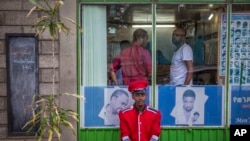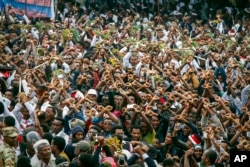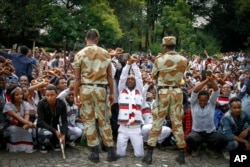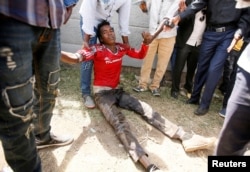The state of emergency in effect in Ethiopia since October 8 is being used broadly to silence critical media voices and lock up suspected dissidents, according to a range of reports coming in from the country.
More than 1,000 people who are considered “ringleaders” or “bandits” have been arrested in Ethiopia since a national state of emergency began, according to state-controlled Fana Broadcasting Corporation (FBC).
Some of the hotspots have included north Gonder and the surrounding region where 93 arrests were made; Kelem Welega Zone in Oromia where 110 people were arrested; Guji Zone in Oromia where 302 people were arrested and Western Arsi in Oromia where 670 people were arrested, FBC reported.
The number of arrests adds to earlier reports of 1,000 people arrested in Sebeta town according to its mayor, Ararsa Merdesa, who spoke to the Associated Press.
Information crackdown
The country is also taking steps to prevent information from getting out. The internet is shut down and the act of posting updates about the security situation on Facebook has been declared a crime.
It has also been made illegal to watch certain opposition cable and satellite channels. The Oromia Media Network (OMN), a satellite television channel based in Minnesota that broadcasts into Ethiopia, and Ethiopian Satellite Television and Radio (ESAT), one of the largest broadcasters into the country and run by the diaspora, were both labeled terrorist groups and singled out in the state of emergency’s Article 2.
Jawar Mohammed, executive director of OMN said that this is not an unusual occurrence since the government has jammed his broadcast signal 15 times over the last two and a half years.
“I think the key objective of the state of emergency is to reinstall fear in people’s minds,” Mohammed told VOA. “Because the breakdown of fear, people coming out in large numbers, is seen as threatening so that’s what they attempted to do.”
Mohammed said he is heartened to see that, despite the attempts at intimidation, people continue to send his station video, photo and text updates.
“We have thousands of people scattered across the region reporting to us with tangible evidence: videos, pictures of the regime’s brutality and the bravery of our people,” he said. “We are broadcasting this to Oromia, connecting all corners of the region. The government perceives that as a serious threat.”
Kassahun Yilma, editor and producer of ESAT, based in Washington D.C., said his station has also been blocked. However, Yilma said the current protests will be difficult to stifle since they are not centered in one area or being led by one single source.
He sees it as mobilizing people across ethnic lines, and including both young and old people and rural and urban inhabitants. “It includes all the society,” Yilma said. “Before it has been just the students protesting in their campus, but now it includes all kinds of people in Ethiopia.”
Continued beatings and arrests
Reports from witnesses on the ground paint a picture of a widespread crackdown across much of the Oromia and Amhara regions of the country. In Ambo, a town west of the capital, a resident said that arrests occurred on the streets and students were being pulled out of classrooms and arrested.
“They are taking people just because they suspect something and they check people's mobiles or they just arrest people,” the resident told VOA's Amharic Service. “They are also asking people to disassemble their satellite dish and if people refuse, they arrest them.
"They are also searching people’s homes and taking people who they are saying have links with OLF,” the resident said.
The Oromo Liberation Front (OLF) is an opposition group considered a terrorist organization in Ethiopia and has its bases abroad. The government blames anti-government protests on OLF and other groups that it labels “anti-peace elements.”
Ethiopia has charged that these groups are supported by foreign governments. “We know for a fact that the terrorist group OLF is receiving all kinds of support from Egypt,” said Getachew Reda, the Ethiopian government spokesman speaking to reporters earlier this month.
In small towns in the Oromia region, residents report that security forces are going door to door to enforce the information blackout. “They beat people at night after 6:00 p.m. going from one house to another,” a witness told VOA's Amharic service. “They are asking people not to watch or use their satellite dishes and don't watch ESAT and OMN. If people's home are found with these satellite dishes, they beat them brutally, even when they are bleeding.”
International call for accountability
Human rights groups and many world leaders are denouncing the crackdown and urging the government to opt for dialogue and reform. “It is the government’s failure to constructively engage with the protesters that continues to fuel these protests,” said Muthoni Wanyeki of Amnesty International. “It must now change course.”
The U.S. Department of State called on the Ethiopian government to address grievances in the Amhara and Oromia regions by opening political space and respecting the freedoms and democratic rights in the country’s constitution.
Tsion Girma contributed to this report







